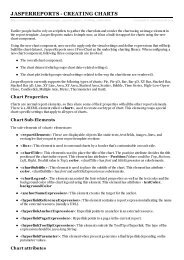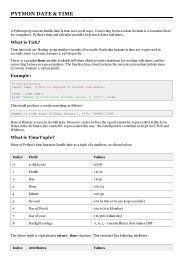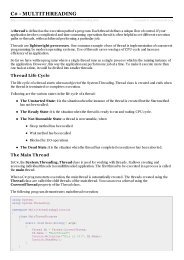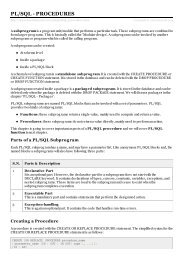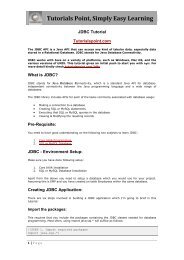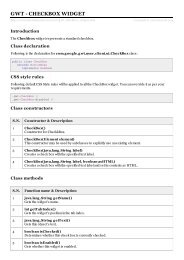Download Scala Tutorial (PDF Version) - Tutorials Point
Download Scala Tutorial (PDF Version) - Tutorials Point
Download Scala Tutorial (PDF Version) - Tutorials Point
You also want an ePaper? Increase the reach of your titles
YUMPU automatically turns print PDFs into web optimized ePapers that Google loves.
Finds the smallest element.<br />
31<br />
32<br />
33<br />
34<br />
35<br />
36<br />
37<br />
38<br />
39<br />
40<br />
41<br />
42<br />
43<br />
44<br />
45<br />
def mkString: String<br />
Displays all elements of this shrinkable collection in a string.<br />
def product: (A, B)<br />
Returns the product of all elements of this shrinkable collection with respect to the * operator in num.<br />
def remove(key: A): Option[B]<br />
Removes a key from this map, returning the value associated previously with that key as an option.<br />
def retain(p: (A, B) => Boolean): Map.this.type<br />
Retains only those mappings for which the predicate p returns true.<br />
def size: Int<br />
Return the number of elements in this map.<br />
def sum: (A, B)<br />
Returns the sum of all elements of this shrinkable collection with respect to the + operator in num.<br />
def tail: Map[A, B]<br />
Returns all elements except the first.<br />
def take(n: Int): Map[A, B]<br />
Returns first n elements.<br />
def takeRight(n: Int): Map[A, B]<br />
Returns last n elements.<br />
def takeWhile(p: ((A, B)) => Boolean): Map[A, B]<br />
Takes longest prefix of elements that satisfy a predicate.<br />
def toArray: Array[(A, B)]<br />
Converts this shrinkable collection to an array.<br />
def toBuffer[B >: A]: Buffer[B]<br />
Returns a buffer containing all elements of this map.<br />
def toList: List[A]<br />
Returns a list containing all elements of this map.<br />
def toSeq: Seq[A]<br />
Returns a seq containing all elements of this map.<br />
def toSet: Set[A]<br />
Returns a set containing all elements of this map.<br />
46<br />
def toString(): String<br />
Returns a String representation of the object.<br />
<strong>Scala</strong> Tuples<br />
<strong>Scala</strong> tuple combines a fixed number of items together so that they can be passed around as a whole. Unlike an<br />
array or list, a tuple can hold objects with different types but they are also immutable. Here is an example of a tuple<br />
holding an integer, a string, and the console:<br />
val t = (1, "hello", Console)<br />
Which is syntactic sugar (short cut) for the following:<br />
TUTORIALS POINT<br />
Simply Easy Learning



